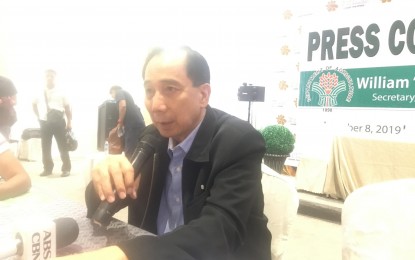
FOOD SECURITY. Department of Agriculture Secretary William Dar answers questions from media practitioners in Albay after attending the 18th National Vegetable Congress on Tuesday (Oct. 8, 2019) hosted by Albay province. Dar cited Bicol as 108 percent rice and food secured region. (Photo by Connie Calipay)
LEGAZPI CITY -- Agriculture Secretary William Dar has urged farmers to diversify their farming practices while continuing to produce rice, corn, and coconut -- the main agricultural products in the country.
Under the crop diversification strategy, farmers' income would not only rely on rice, corn, and coconut as "there is more income to derive from planting vegetables and serve as an income booster", said Dar on Tuesday in his address to thousands of participants to the 18th National Vegetable Congress.
The congress is a two-day forum hosted by Albay Province that will run until Wednesday.
Dar in a press conference said in improving the country’s agricultural industry “we need to formulate a crop diversification program to improved farmers' income.”
“Today I would call it a rice-centric agricultural country, but we can never just live with rice alone, we need to diversify Philippine agriculture,” he added.
He said currently the value of the vegetable industry in the country is placed at PHP54 billion. Benguet province supplies 85 percent of the vegetable needs in Metro Manila.
He, however, said for this industry to prosper it needs to embrace new technologies to develop through intercropping methods and grow vegetables and other crops such as cacao, garlic, onions, cauliflower, broccoli, and potatoes.
Dar also laid down his Philippine agri-development program which include: modernization of agri sector; agri-industrialization aimed at building export development plan; developed a farm consolidation as an economy of scale strategy to invite big business partnering with farmers and fisherfolk; infrastructures needed for enhancing agri and rural development; increase agency budget; private sector investment; and institutionalization of programs and projects.
He said this "agri-paradigm shift" would be realized further with the proper utilization of PHP10 billion a year rice competitiveness enhancement program where PHP5 billion would be used for mechanization; PHP3 billion for seed distribution and PHP1 billion each for additional capital for farmers and skills development.
Asked about the clamor of farmers to repeal the rice tariffication law (RTL), Dar said that he is considering the sentiments of farmers, however, “let's give the law a try” if in one-year time there are still issues disadvantageous to the farmers, he will strongly ask for the revision or a repeal of the law.
Dar also met with several local chief executives where he presented the current agricultural concerns such as the effects of the RTL, Asian swine fever, and local government support for agriculture.
Dar even cited Bicol as 108 percent rice and food secured region. (PNA)
